Description
West Coast Native Coconut Plant – A Hardy Tall Variety for Sustainable High-Yield Coconut Farming
The West Coast Native Coconut Plant is one of the oldest and most reliable tall coconut varieties grown extensively along India’s western coastal belt. Known for its hardiness, consistent yield, pest resistance, and long productive life, this native breed is a time-tested choice for farmers, gardeners, and plantation owners who want to establish a sustainable coconut farm. If you are looking for a high-yielding, organic, drought-tolerant coconut plant, the West Coast Native Coconut variety is the ideal option for long-term cultivation.
Traditional Heritage and Origin
The West Coast Native Coconut Plant is a true indigenous tall variety, nurtured for centuries by farmers in the coastal states of Kerala, Karnataka, Goa, and Maharashtra. Over generations, it has naturally adapted to humid, saline, and wind-prone environments typical of the western coastline. This heritage breed is GMO-free and naturally pollinated, ensuring genetic purity and uniformity. Selecting this native variety supports biodiversity conservation and sustainable traditional agriculture while providing you with a robust and stable planting material.
High Yield and Quality Nuts
One of the strongest reasons to choose this plant is its consistent nut production. The West Coast Native Coconut Plant starts bearing fruits from the 4th to 5th year after planting, producing about 180–220 coconuts per palm every year under good management. The nuts are medium to large in size, with high copra content and sweet water, making them suitable for both tender coconut and dry copra production. This dual-purpose use makes the variety highly profitable for farmers catering to multiple market segments.
Naturally Hardy and Resilient
The West Coast Native Coconut Plant is known for its natural resistance to common pests and diseases that usually affect hybrid varieties. Its deep root system and strong trunk structure make it highly wind-resistant, which is a big advantage for farms located in coastal cyclone-prone regions. The plant also shows good tolerance to drought conditions, meaning it can survive with minimal irrigation during summer months. These characteristics reduce the need for chemical pesticides and intensive care, thereby lowering the overall cultivation cost.
Perfect for Organic and Sustainable Farming
This native tall variety is ideal for organic farming practices. It thrives on natural manures, compost, and biofertilizers and does not require synthetic chemical inputs. Its inherent disease resistance and resilience mean farmers can maintain a chemical-free, eco-friendly cultivation system, producing organic coconuts and copra for premium markets. Choosing the West Coast Native Coconut Plant is a step toward sustainable, climate-smart agriculture that protects soil health and the environment.
⏳ Long Productive Lifespan
One of the biggest benefits of the West Coast Native Coconut Plant is its extraordinarily long lifespan. It can live and remain productive for up to 100 years or more, offering decades of consistent harvests. This makes it a long-term agricultural investment for your farm or garden. Once the tree establishes, it continues to flower and produce nuts steadily for generations, providing sustainable income with minimal upkeep.
Ideal Climate and Soil Conditions
The West Coast Native Coconut Plant performs best in warm, humid tropical climates, especially in coastal and near-coastal regions. It grows well in well-drained sandy loam, red soils, and coastal alluvial soils. Planting is ideally done during the monsoon season (June–August) to help the young saplings establish strong roots. Maintain a spacing of 25 to 30 feet between each plant to allow enough sunlight, airflow, and crown growth. With minimal care, this plant becomes a towering, productive tree reaching 60–80 feet in height over its lifetime.
Benefits for Farmers and Growers
-
Provides steady annual income for decades with low input costs.
-
Strong resistance to wind damage, pests, and drought, reducing farming risk.
-
Ideal for organic certification and production of pesticide-free coconuts.
-
Allows intercropping with short-duration crops during early years to increase revenue.
-
Enhances farm biodiversity and soil fertility with natural leaf litter and organic matter.
-
A low-maintenance and climate-resilient crop suitable for long-term sustainability.
Whether you are a small-scale farmer, large plantation owner, or home garden enthusiast, the West Coast Native Coconut Plant is a dependable choice that delivers high yields and stable income for generations.
Key Features at a Glance
-
Variety: West Coast Native Tall Coconut
-
Yield: 180–220 coconuts per tree annually
-
Bearing Age: From 4th to 5th year
-
Lifespan: 100+ years
-
Resistance: High drought, pest, and wind resistance
-
Cultivation: Organic and GMO-free
-
Climate: Ideal for coastal and tropical regions
-
Height: Grows up to 60–80 feet tall
Conclusion
Choosing the West Coast Native Coconut Plant means choosing a century-long legacy of strength, productivity, and sustainability. With its early bearing age, high yield, pest resistance, wind tolerance, and long lifespan, this native tall variety stands as a pillar of traditional coastal agriculture. It is the ideal choice for farmers seeking low-maintenance, high-return, eco-friendly coconut farming.
Plant the West Coast Native Coconut Plant today and secure a profitable and sustainable future for your farm, your family, and the environment.
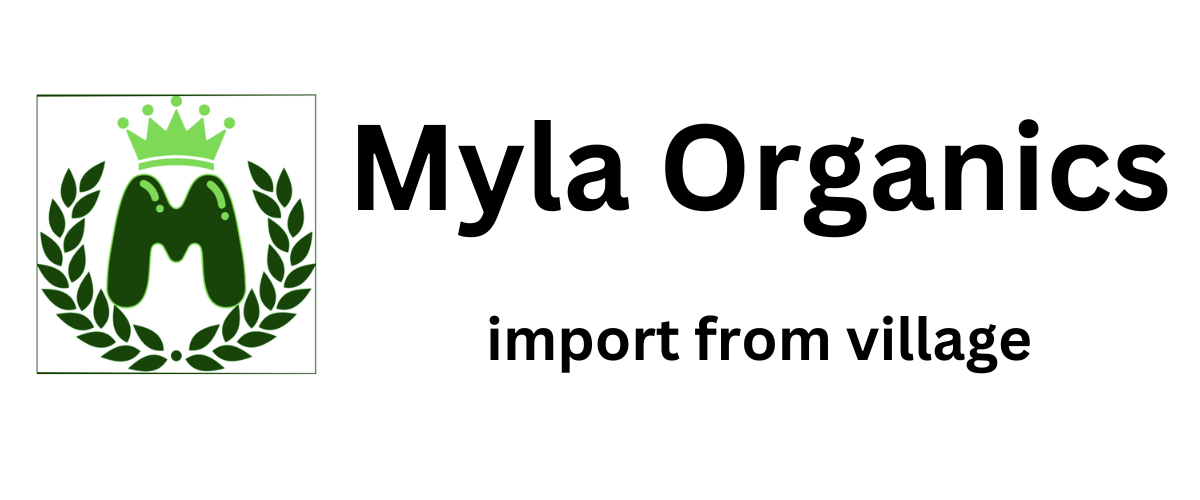
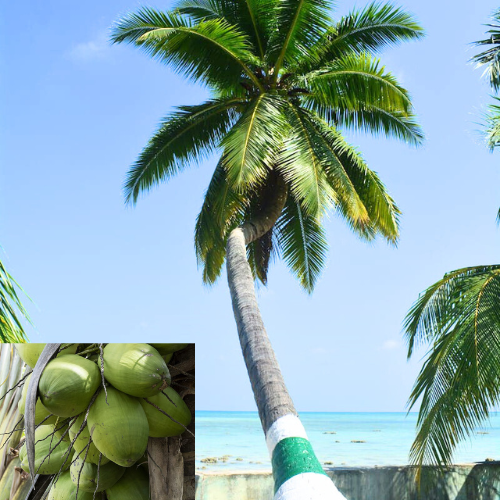
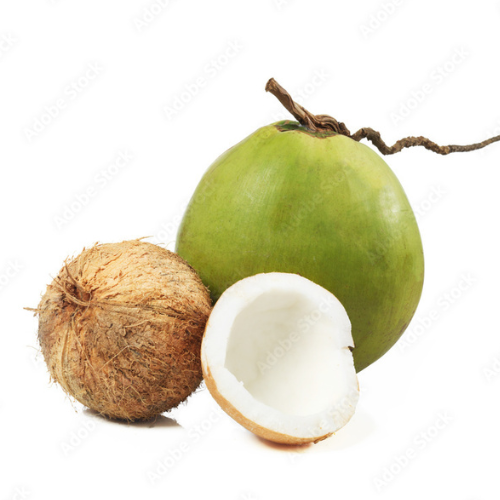
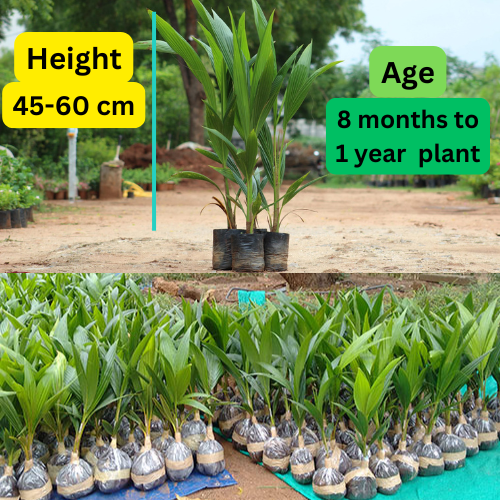


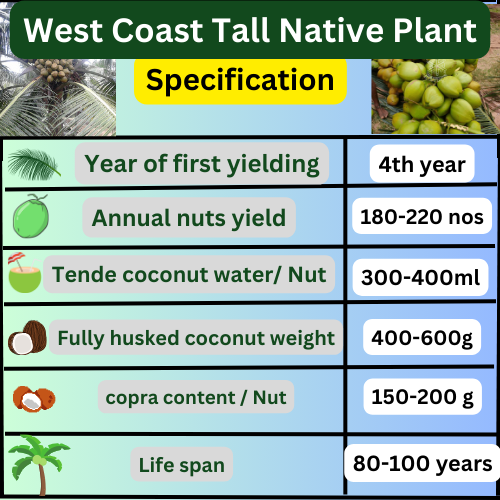


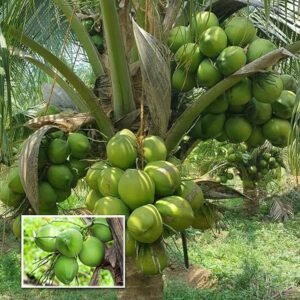

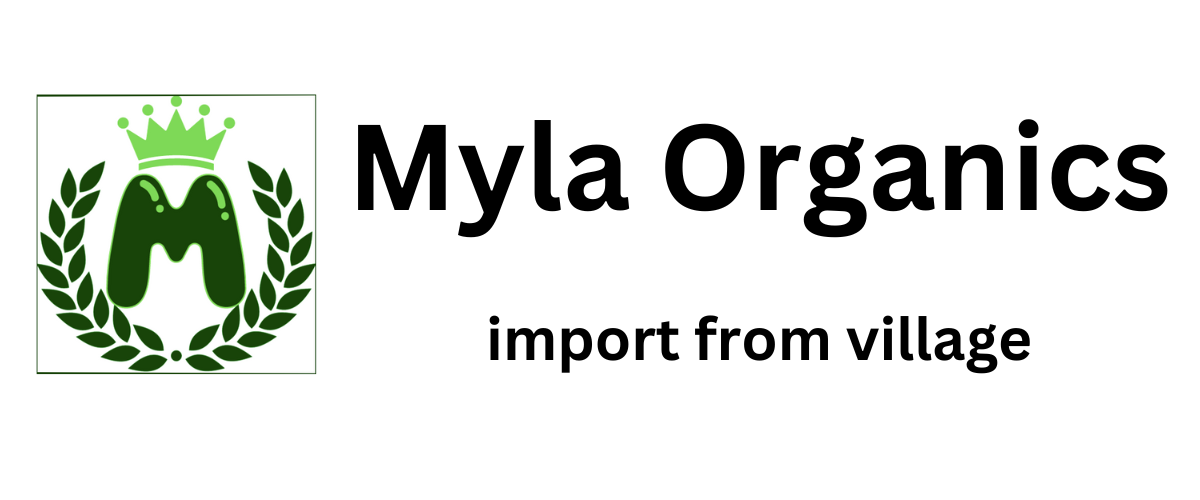

Reviews
There are no reviews yet.